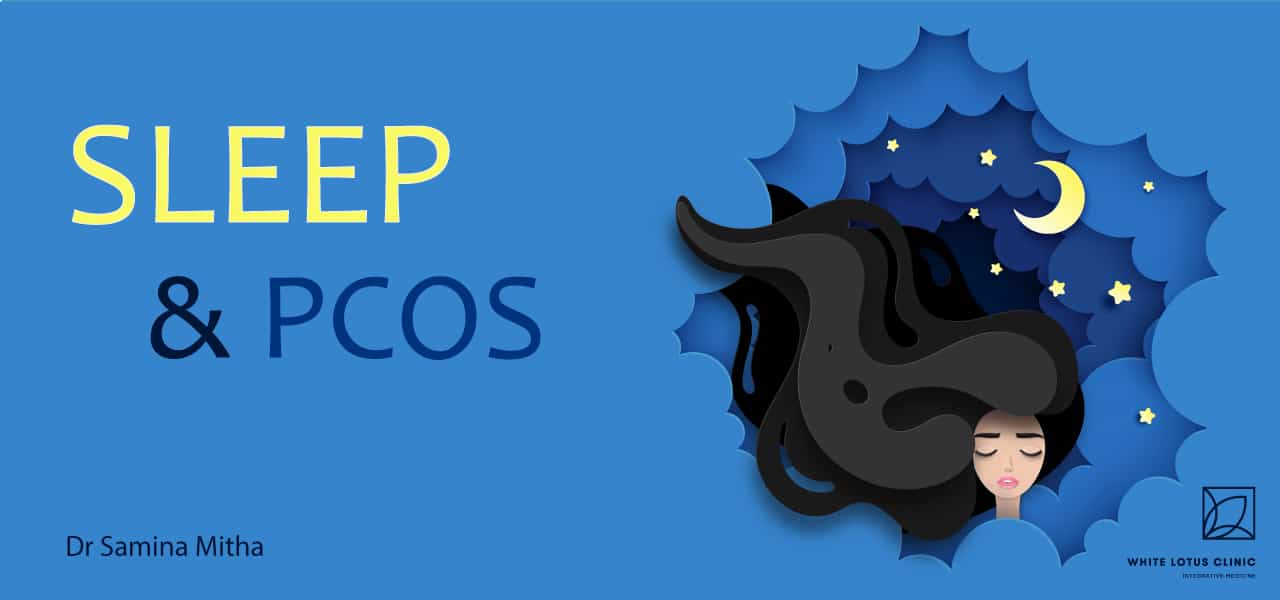Learn what we know about how sleep and PCOS are connected
Hopefully, we’ve all felt the experience of getting into a nice cozy bed, turning down the lights and drifting off into a sound sleep, only to wake up in the morning to discover we were in the exact same position we went to sleep in. This is the type of sleep I dream of having (literally!), and I think you might too! So how are sleep and PCOS connected? Let’s find out.
Sleep is such an important foundation for good health. We require deep, restful sleep in order to restore many of our body’s functions. Good sleep every night prevents heart disease, lowers inflammation, may impact our weight, supports a healthy immune system, improves concentration and focus, improves mental health, and could even prevent type 2 diabetes.

Common Sleep Issues with PCOS
Insomnia is defined as the impaired ability to initiate or maintain sleep. It also includes long periods of wakefulness throughout the night.
Research shows that women with PCOS are more likely to have sleep disturbances than those who don’t have this condition. Sleep disturbances in women with PCOS include difficulty falling asleep and staying asleep. In fact, these disturbances were 2x more likely in women with PCOS than women without the syndrome.
Common Factors Associated with Sleep Disturbances

1. Obesity and insulin resistance
Due to the fact that PCOS is considered a metabolic disorder, insulin and glucose are often impacted. Insulin resistance is commonly seen in women with PCOS, and can lead to increased weight gain. Furthermore, obesity is one of the strongest risk factors for Obstructive Sleep Apnea (OSA).
OSA is known as frequent cessations of breathing during sleep, and can occur alongside other sleep disturbances. Additionally, as seen in Dr. Kelly’s article on sleep and insulin, the shorter the sleep duration, the greater number of calories you’ll eat the next day.
2. Cortisol and Mental Health
In a sample of 114 women with PCOS, those with a history of depression had a threefold increase in developing sleep issues. Furthermore, evidence suggests that women with PCOS have a heightened emotional response to stress. Additionally, anxiety and depression are higher among women with PCOS. We know that anxiety and depression can impact sleep, so it’s vital to manage these mental health concerns. When it comes to sleep and PCOS, all of these health issues are interconnected.
3. Lifestyle behaviours
Lifestyle behaviours such as smoking, alcohol consumption, and lack of physical activity are associated with impaired sleep. Additionally, smoking is associated with short sleep cycles and decreased sleep quality. Alcohol consumption can be associated with snoring and OSA. In addition, many women with PCOS are less active and may have difficulties sustaining exercise over a long period of time.
Naturopathic Treatments:
1. Diet

Dietary recommendations should be centered around improving insulin sensitivity if you have insulin resistance. One of the ways to do this is by eating a diet for insulin resistance. An ideal diet for this condition centers around high fat, high, protein and low carbohydrates. This allows insulin levels to lower, resulting in the body using fat store as energy (instead of muscle). In turn, this will result in your body’s ability to lose weight.
2. Supplements
In order to choose the appropriate supplements, focus on helping to bring cortisol levels down at night. This allows melatonin to rise so you can fall asleep.
GABA is an inhibitory neurotransmitter that quiets the nervous system. This lowers anxiety and increases relaxation. GABA can be used as a supplement to help with sleep at a dose of 100-200mg.
Additionally, supplements that help to increase GABA levels include magnesium bisglycinate and L-theanine.
3. Botanicals
One of the more popular botanicals for the adrenal gland (which produces cortisol, our stress hormone) is ashwaghanda (Withania somnifera). This botanical is known for its ability to balance cortisol throughout the day. A recent randomized control trial study in 2019, showed ashwaghanda at 300mg twice daily improved sleep quality and onset.
Other herbs that help with improving GABA levels include passionflower and valerian. Both of these also help with anxiety.
4. Lifestyle – Sleep Hygiene

Sleep hygiene habits are incredibly important when it comes to ensuring you get good quality sleep. Consider these tips below when creating a bedtime routine.
- Keep all electronics off for at least 1 hour before bedtime
- Make your room as dark as possible
- Start to dim lights in your house an hour before going to bed
- Choose comfortable bedding
- Create a calm, zen-like experience in your room, by removing clutter and maintaining a relaxing environment
- Sleep at the same time every night
- Consider sleeping nude to reduce body temperature
- Your room should be only used for sex and sleep
- Avoid stimulating activities before bedtime
- Try to reduce or avoid caffeine during the day
- Don’t eat sugary snacks before bedtime
- Keep exercise to the morning or mid afternoon
- Make a to do-list or journal as you wind down for bed
- Take a hot shower/bath before bedtime
- Avoid napping
- Develop a calming bedtime routine – maybe its reading a book, drinking a tea, meditating, listening to music, yoga, etc.
Key Points:
– Research shows that women with PCOS are more likely to have disturbances with sleep compared to those who don’t have it.
– Common factors in linked sleep and PCOS disturbances include weight gain, mental health, and lifestyle factors such as smoking, alcohol consumption and exercise.
– Naturopathic treatments for insomnia include dietary changes, supplements/botanicals, and lifestyle changes
Next Steps:
Book a consultation with one of our Naturopathic Doctors to get sleep support.
Read “How Sleep Impacts Insulin Levels” by Dr. Kelly Clinning




